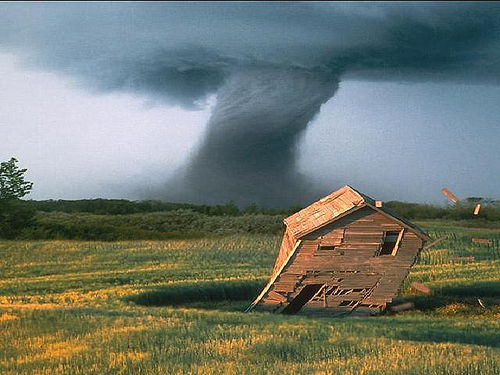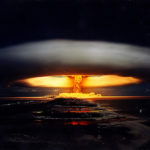We run our website the way we wished the whole internet worked: we provide high quality original content with no ads. We are funded solely by your direct support. Please consider supporting this project.

“Natural” Evil? 7 Arguments Implicating Satan
Image by Jmos® via Flickr
We believe that God is the Creator of nature, but nature simply does not seem to point to a God of love. Parasites, viruses, bacteria, diseases and cancer kill millions and torment millions more, humans and animals alike. Earthquakes, hurricanes, tsunamis, mudslides and volcanoes do the same.
Theists have traditionally argued that God has a greater purpose for allowing “natural” evil to exist in creation. They argue that through “natural” evils, God is teaching us, punishing us, refining us, or something of the sort. Other less traditional theists have argued that these things are inevitable side effects of other positive things in creation, such as allowing for creation to exemplify its own creativity and spontaneity.
Both views fall short because they fail to acknowledge the role that Satan and fallen Powers play in creation. We cannot adequately explain “natural” evil unless we accept that Satan and other rebellious cosmic forces have had a corrupting influence on creation.
In what follows I offer seven brief arguments supporting this position.
1. The Argument From Animal Suffering
If God is the Creator of nature, and if it’s true that nature sometimes (often!) makes animals suffer, then it seems we have to either:
- a) hold that God is responsible for animal suffering, hence is not all good;
- b) hold that God is all good, but animal suffering is necessary; or
- c) hold that free agents are responsible for animal suffering.
Option (a) obviously isn’t viable for people who believe God is all good. Option (b) is a possibility, but I’ve frankly never found a convincing argument in its defense. An all-powerful God surely could have created an animal kingdom where survival doesn’t hang on devouring other animals, for example. So, we’re left with option (c). This is the option we presuppose when we hold humans culpable for inflicting suffering on animals.
But when no human is involved, who are we to hold responsible? The only possible answer, so far as I can see, is non-human free agents.
2. The Argument From Demonically Influenced Infirmities
The Gospels frequently (but not always) attribute infirmities to demonic activity. We must remember the incredible stature and authority ascribed to Satan in the New Testament. He is called (among other things) the “lord” (archon) of the world (Jn 12:31, 14:30; 16:11), the principality and power of the air (Eph 2:2) and the god of this age (2 Cor. 4:4). He is said to control the entire world (IJn 5:19) and to own all the authority of all the kingdoms of the world (Lk 4:5-7). In this light, why should we think it impossible that this fallen archangel, along with his minions, has messed with the natural order of things?
3. The Argument from God’s Creational Battles
There are dozens of passages—other than those found in Genesis 1 and 2— that refer to God’s act of creation. And all of them involve God battling forces of evil and/or chaos (see, eg. Ps. 29:3-4; 104:3-9; 74:10-13. 89:9-10; Prov. 8: 27-29; Job 9:13; 38:6-11; Hab 3:8-15). Biblical authors are uniformly confident that Yahweh can handle these cosmic foes. Yet, his victory is considered praiseworthy precisely because these foes are real and formidable. These passages teach that God faces opposition on a cosmic level when he creates and preserves the world.
4. The Argument from God’s Non-Violent Creational Ideal
In the creation account in Genesis 1:29-30, God didn’t give animals to each other to eat. Nor did God give animals to humans to eat. This is reiterated in Genesis 2 when the Lord tells Adam he was “free to eat from any tree in the garden” (vs. 16-17). Adam was not free to eat any of the animals. It seems, then, that the food chain in God’s ideal creation was non-carnivorous and non-violent.
5. The Argument from a Cursed Nature
Genesis 3 gives us an account of the “fall” (or “rebellion”) of humans. Between verses 14 and 19 we learn that because of the fall:
- there will be hostility between snakes and people (vs. 15)
- women will experience pain in child birth (vs. 16)
- the earth will be stubborn in yielding vegetation (vss. 17 & 19)
- vegetation will now contain thorns and thistles (vs. 18)
- humans will die (vs. 19)
The world we now live in is cursed. This means that the laws of nature that have naturally brought about hostile snakes, pain in childbirth, hard-to-till soil, thorns and thistles and death are not altogether “natural.” They do not conform to God’s creational ideal. They rather reflect a nature that has been cursed.
6. The Argument from Cosmic Redemption
The New Testament teaches that Christ died not just to redeem humans; he died to restore the entire creation or “all things” as Paul states in Col. 1:19-20. He also says the whole creation is groaning to be “liberated from its bondage to decay and brought into the freedom and glory of the children of God” (Rom. 8:21). Clearly, the creation we currently live in is not the creation God originally spoke into being. It’s been corrupted.
7. An Argument from the Early Church Fathers
The primary way the early theologians explained evil in nature was by appealing to the work of Satan, powers and demons. These fathers uniformly believed that angels, like humans, were created free and given a sphere of influence and responsibility over creation. As with humans, angels could use this influence for good, as God intended, or they could choose to use it for evil.
Conclusion
We don’t need to search for good divine purposes behind “natural” evil any more than we need to search for them behind evil that humans inflict on one another. All evil, “natural” or otherwise, is ultimately due to wills other than God.
So the next time a tsunami wipes out an entire village or an earthquake massacres thousands of people; the next time you hear about the millions suffering from drought and famine, or when you consider the untold pain of millions suffering and dying from any number of other diseases, don’t say “This is the work of God.” Say rather, “An Enemy has done this” (Mt 13:28).
This post is an abbreviated version of an earlier article by Greg. If you’d like to read the more detailed post, you can find it here.
Also check out this Q & A on the topic of Spiritual Warfare.
Category: General
Tags: Creation, God at War, Natural Evil, Problem of Evil, Satan, Theodicy, Warfare Worldview
Topics: Creation Care, Spiritual Warfare, Cosmic Conflict
Related Reading

The Universal Experience of the “Spiritual”
Humans have from prehistoric times generally assumed the reality of spirits who transcend our physical existence. Outside of post-Enlightenment western intellectual culture the belief in spirits is almost universal. Whether conceptualized as spirits of nature or as power animals (as in primordial cultures), as helpful malã’ika or malicious Jinn (Islam) or as guardian angels or…

Baby Universalism and Reasonable Infanticide
Here’s a perfectly random brain stimulator: In contemporary western Christianity it is almost universally assumed that deceased babies automatically go to heaven. I call this the doctrine of “baby universalism” (similar to “canine universalism” = “all dogs go to heaven”). There are a few scriptural passages that can be used to support this perspective (e.g.…

Why did God create me to be a pedophile?
Question: Since the first time I experienced a sex drive it’s been directed towards little children. I’ve never acted on this, for I know it’s wrong. But it torments me. Why would God created me with pedophile cravings? Answer: I’m so sorry for your condition and greatly respect the fact that you have committed yourself…

Did God Cause the Polar Vortex?
When is this polar vortex thing going to end? It’s March, and even in Minnesota we expect to see temperatures warmer than this. With all of the sleet and cold in the south, it seems like schools are closing more than they are open. While this is not a catastrophic event like a hurricane, tsunami,…

So Much Evil. Why?
In light of the profound evil being experienced by the people of Paris and countless other locations around the world, we thought we would raise again the question that many ask when things like this occur: Why? Of course, Greg has spent much of his writing and speaking energy addressing this. Here is a basic,…

How the Cross Erases Your Sin
In Colossians 2:14, we read how God canceled the charge of our legal indebtedness which stood against us and condemned us. That word “canceled,” means to wipe out, to erase, or to abolish. By means of the cross, God wiped out our indebtedness to the law that stood over us that Satan used to condemn…
